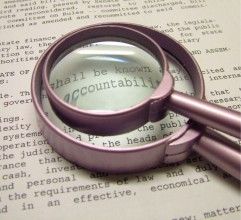CA transparency reform initiative filed
by James Poulos | November 10, 2015 4:50 am
 [1]A new state ballot initiative aimed at bringing greater transparency to Sacramento has been filed with the attorney general’s office.
[1]A new state ballot initiative aimed at bringing greater transparency to Sacramento has been filed with the attorney general’s office.
Charles Munger, Jr., one of the state GOP’s most substantial activists and donors, linked up with former state Sen. Sam Blakeslee, R-San Luis Obispo, to write and file the initiative with attorney general Kamala Harris. “It’s time to put government transparency on the ballot and enact these reforms through direct democracy,” the pair announced in a release, as Politico noted[2].
The two have kept very different profiles in recent years. Blakeslee opted against seeking re-election in 2012, instead turning his focus to academia, now the founding Director of the Institute for Advanced Technology & Public Policy at Cal Poly, San Luis Obispo. Munger, once credited by a Republican strategist with preventing the state GOP from being “driven into the sea,” has thrown his support behind ballot measures in the past. “He has tried to block tax hikes, diminish the power of labor unions and stop lawmakers from drafting election maps to their liking,” the Los Angeles Times recalled[3].
Click here to read the proposed ballot measure[4].
Going public
The initiative’s drafters hinged their argument on the prevalence of token transparency in California. Citizens frequently opt not to exercise their right to political participation, as the state’s low voter turnout in recent election years has underscored. But the scope of civic involvement, which can extend far beyond simply casting a ballot, has also narrowed for structural reasons the initiative would mitigate. Obtaining public records, for instance, has frequently become a cumbersome and intimidating challenge. And while the state Constitution “currently provides that the proceedings of each house and the committees thereof shall be open and public,” according[5] to the initiative filing’s findings and declarations, “few citizens have the ability to attend legislative proceedings in person, and many legislative proceedings go completely unobserved by the public and press, often leaving no record of what was said.”
To create such a record, the CLTA would constitutionally “guarantee the right of all persons, including members of the press, to freely record legislative proceedings and to broadcast, post, or otherwise transmit those recordings,” while also requiring the Legislature “to make and post audiovisual recordings of all public proceedings to the Internet,” placing them in a lasting public archive.
Behind closed doors
Critics of the current process have consistently argued that the lack of a public proceedings records enables legislators to quietly rush through controversial, unpopular, or ill-advised bills. These machinations have included so-called “gut-and-amend” maneuvers, wherein would-be laws are evacuated of their content and filled up with completely different contents. As Gary Galles recalled[6] in the Los Angeles Daily News, Sacramento’s recent track record has ranged from “a Silverlake Reservoir bill’s transformation into a requirement that gun buyback programs test weapons for involvement in crimes” to “a bill whose subject morphed from California Environmental Quality Act exemptions for housing projects to increased funding for alternative vehicle technology.”
Under the proposed changes, some types of relative secrecy would stay protected. The Act would permit closed legislative sessions under three circumstances: conferences with legal counsel; discussions concerning the safety and security of legislative buildings, employees or legislators themselves; and considerations around employment-related issues.
A new approach
The Act would also institute a 72-hour advance notice period for the public review of bills before they are voted upon — a standard component of so-called “sunshine” laws around the country. That provision in particular struck a chord with public interest advocates. “California Forward has long advocated for giving lawmakers and the public at least 72 hours to review a bill before a final vote. We also know from our extensive consultation with the public that more transparency is essential to improving the public’s confidence in the Legislature,” said[7] James Mayer, the group’s president and CEO. “The ’72-hour rule’ has had bipartisan support in the Legislature and we hope voters get a chance to vote on a measure that would improve their ability to see how the public’s business is conducted in the capitol.”
Strategically, the CLTA has been positioned as a way to bring statewide reform to California politics in easy-to-understand and digestible form. Tim Draper, creator of the ballyhooed “Six Californias” initiative, shifted from that scheme to a new “Fix California Challenge” aimed at funding fresh reforms. “He just announced two winners,” noted[8] Steven Greenhut at U-T San Diego, “one of which is this transparency initiative.”
- [Image]: http://calwatchdog.com/wp-content/uploads/2015/11/Transparency2.jpg
- noted: http://www.politico.com/tipsheets/california-playbook/2015/10/politico-california-playbook-presented-by-phrma-hillarys-sf-money-elite-talks-oakland-nurses-for-sanders-bonilla-bows-out-210698
- recalled: http://www.latimes.com/local/politics/la-me-adv-munger-20150304-story.html
- Click here to read the proposed ballot measure: https://oag.ca.gov/system/files/initiatives/pdfs/15-0083%20%28Legislature%20Transparency%29.pdf
- according: https://oag.ca.gov/system/files/initiatives/pdfs/15-0083%20%28Legislature%20Transparency%29.pdf
- recalled: http://www.dailynews.com/opinion/20150823/gut-and-amend-legislation-subverts-good-government-guest-commentary
- said: http://www.cafwd.org/reporting/entry/ca-fwds-statement-on-proposed-ballot-measure-california-legislature-transpa
- noted: http://www.sandiegouniontribune.com/news/2015/oct/14/initiative-targets-backdoor-capitol-deals/
Source URL: https://calwatchdog.com/2015/11/10/ca-transparency-reform-initiative-filed/